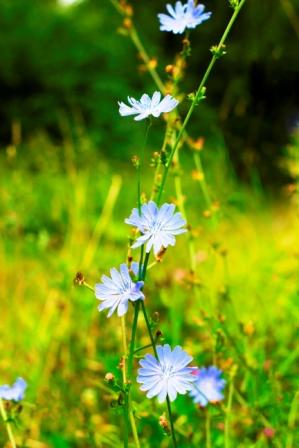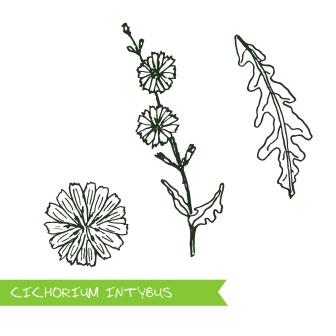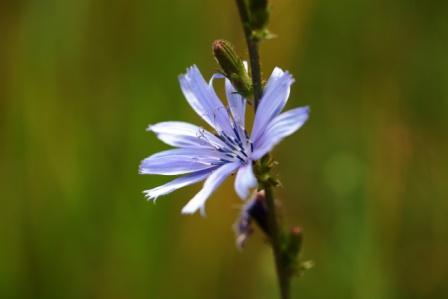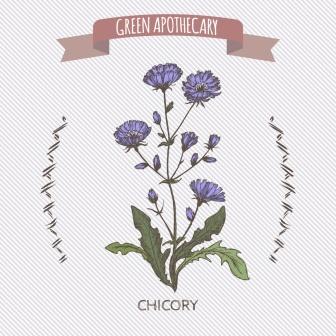Chicory Cichorium intybus: Benefits, Remedies, Research, Side Effects
Chicory – Cichorium intybus is used for the treatment of headache, insomnia, fever, weakness of the cardiac muscles and general debility.
Latin name- Cichorium intybus Linn.
Family- Asteraceae (Bhringaraja kula)

Table of Contents
Vernacular names
Names in different languages:
Hindi name- Kasani, Chichori, Kasni
English name- Chicory, Endive, Blue daisy
Arabic name- Hinduba
Tamil name- Kasinikkerai
Synonyms
gulahanta – Plant appears like a bush
Kasanaja – Reduces cough

Morphology, Habitat
Morphology:
Chicory is a small shrub growing to a height of 2- 3 feet. The flowers are usually blue colored, 1-1.5 inch in diameter. The root is fleshy with white color inside and brown color outside. When flowering, chicory has a tough, grooved, and more or less hairy stem, from 30 to 100 cm (10 to 40 in) tall.
Habitat of Chicori
The plant is a native of Europe which later spread to other parts of the world. In India the plant is found in the North West and South East part.
Usually the seeds or the root is dried, roasted and used along with coffee seeds as a drink.

Scientific classification
Kingdom: Plantae
Order: Asterales
Family: Asteraceae
Tribe: Cichorieae
Genus: Cichorium
Species: C. intybus
Properties, part used, dosage
Properties:
Rasa (Taste) – Tikta (Bitter)
Guna (Qualities) – Laghu (Light for digestion), Ruksha (Dry in nature)
Vipaka – Katu (Undergoes Pungent taste after digestion)
Veerya (Potency) – Ushna (Hot)
Karma (Actions) – Kaphapitta shamaka (reduces vitiated kapha and pitta dosha)
Part used- Leaf, Root and Seed
Dosage-
Powder of seed- 3 to 6 g
Juice of leaf- 10 to 20 ml
Root powder- 3 to 5 g

Sanskrit verse

Chemical constituents
Chemical constituents of Cichorium intybus
The herb contains up to 60% inulin, sesquiterpene lactones and coumarins. Raw chicory root contains citric acid and tartaric acid. The roasted seeds of chicory contain acetic, lactic, pyromucic, palmitic and tartaric acid. When added to coffee, the chicory root counteracts caffeine.
Uses
Uses of Kasani:
- The paste prepared from the leaves of Kasani is applied on the forehead in cases of headache.
- Cold infusion prepared from the roasted root of Cichorium intybus is given in a dose of 25-30 ml in cases of insomnia.
- The cold infusion or decoction prepared from the seeds or root of the plant is given in a dose of 30 ml to treat enlargement of the liver and spleen.
- The powder of the roasted seeds is given regularly in a dose of 3-5 g with milk as cardiac tonic.
- The powder of the seeds or root is given with hot water to treat fever and indigestion.
- The decoction prepared from the root is given in a dose of 25-30 ml in cases of dysmenorrhea.
- The drink prepared from the dried and roasted seeds or roots is given to patients suffering from weakness of the nerves and general debility.
Adverse effects
Adverse effect of Kasani: Prolonged or excessive use of Kasani has sedative action. Hence people working near machines or operating them, drivers should be careful.
Interaction with medicines, supplements
Can this be used while taking Homeopathic medicine?
Yes. This product does not react with homeopathic medicine.
Can this medicine be continued while taking supplements like multivitamin tablets, Omega 3 fatty acids etc?
Yes. Generally, this product goes well with most dietary supplements. However, if you are taking more than one product per day, please consult your doctor for an opinion.
With western
medicines
Seek your
doctor’s advice if you are taking this product along with other western
(allopathic / modern) medicines. Some Ayurvedic herbs can interact with modern
medicine.
If both Ayurvedic and allopathic medicines are advised together, then it is
best to take Allopathic medicine first, wait for 30 minutes and then take the
Ayurvedic medicine.
Ayurvedic formulations
Formulations containing Kasani:
Vasuliv syrup: It is a proprietary ayurvedic medicine useful to treat liver disorders, lack of appetite and promotion of normal growth of hepatic cells.
Bonnisan drops: It is a proprietary ayurvedic medicine useful in treating colic pain in infants, diarrhea, dysentery, abdominal pain and dyspepsia.
Amlycure tablet: It is a proprietary ayurvedic medicine useful as hepato protective agent, aids in digestion and increases the appetite.
Research
Research articles on Cichorium intybus:
Anti- bacterial activity: The hexane and ethyl acetate root extracts of chicory showed pronounced inhibition than chloroform, petroleum ether and water extracts. Root extracts showed more inhibitory action on Bacillus subtilis, Staphylococcus aureus and Salmonella typhi than Micrococcus luteus and Escherichia coli.
Hepato- protective action: The purpose of the study was to assess the phytochemical and hepatoprotective activity of aqueous ethanolic extract of fresh dried leaves of Cichorium intybus against Nimesulide intoxicated albino rats. There was a significant changes in biochemical parameters (increases in serum glutamate pyruvate transaminase (SGPT), Serum glutamate oxaloacetate transaminase (SGOT), alanine phosphatase (ALP) and serum total bilirubin (TB) level) in Nimesulide intoxicated rats, which were restored towards normal values in Cichorium intybus (100 mg/kg, 200 mg/kg and 300 mg/kg, p.o.) treated animals. Histo pathological examination of liver tissues further substantiated these findings. Therefore, the outcome of the present study ascertains that the leaf extract of Cichorium intybus possesses significant hepato protective activity.
Anti- microbial activity: The present study was designed to evaluate the antimicrobial activity of three extracts of medicinal plants, Cichorium intybus, Dorema aucheri and Prangos ferulacea against some food borne pathogens. The studied extracts displayed various degrees of antibacterial activities.
Variants of chicory
Chicory, witloof, raw
Taste – mild sweet and bitter
Properties – light (helps in weight loss)
Potency – hot (improve various functions of digestive system)
After digestion taste transformation ( Vipaka ) – pungent
Effect on Doshas
Vata balancing (reduces arthritis pain, constipation)
Pitta nourishing
Kapha increasing (used as diuretic)
Chicory greens, raw
Taste – bitter, pungent
Properties – Light, dry
Potency – Cold (increases urine output)
After digestion taste transformation ( Vipaka ) – pungent
Effect on Doshas
Vata balancing (leaf paste applied externally relieves swelling and inflammation)
Pitta nourishing – improves appetite
Kapha balancing, useful in cancer,
Chicory roots, raw
Taste – bitter
Properties – light, dry
Potency – hot (may cause acid reflux)
After digestion taste transformation ( Vipaka ) – pungent
Effect on Doshas
Vata balancing
Pitta nourishing (improves appetite)
Kapha balancing (useful in weight loss treatment)
Author: Dr.B.K.Prashanth M.D (Ayu), Ph.D
E mail: [email protected]
Sthanika Karma (Systemic Action)
External use
Prevent burning sensation, Possesses Anti inflammatory action. In Headache, Hepatomegaly, Urticaria, Rheumatoid arthritis its leaf paste can be used for external application.
Internal administration
Nervous system – Calms down the nervous system. Decoction of its seed is indicated in insomnia
Digestive System – Carminative, liver stimulant, Indicated in loss of appetite, low digestive fire, Jaundice, Hepatomegaly, Excessive thirst etc. Especially beneficial in Spleen and Liver disorders.
Circulatory System – it helps to purify blood.
Excretory system – Root and seed is indicated in Dysuria
Satmikarana –Indicated in general body weakness
Reproductive system – Root preparations are indicated in Dysmenorrhea, Amenorrhea etc.
Tapakrama – Indicated in fever and associated burning sensation.










